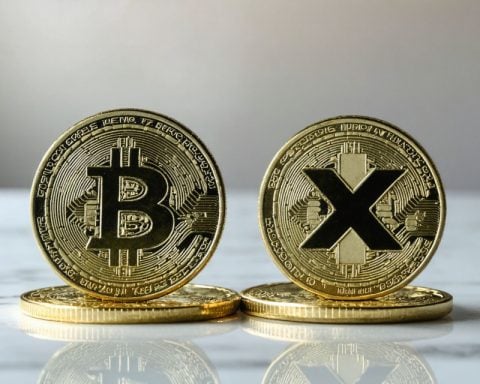A New Era for Cryptocurrency Regulation?
As Ripple Labs’ extended legal face-off with the U.S. Securities and Exchange Commission (SEC) progresses, the implications of its outcome could fundamentally alter the course of cryptocurrency regulation and acceptance in the United States. Beginning in December 2020, the SEC accused Ripple of raising more than $1.3 billion through unregistered sales of its XRP token. Ripple, on the other hand, claims that XRP is not a security and that the SEC’s jurisdiction does not apply.
Now, the lawsuit has escalated into a much broader conversation about the future of digital currency. Observers suggest that the prolonged conflict will persist well into 2025 due to ongoing appeals and changes in SEC leadership.
Redefining Digital Assets
The implications of the lawsuit are profound. Should Ripple prevail, it might pave the way for distinguishing digital assets from securities, fostering a regulatory environment that promotes innovation. Such a ruling could enhance the legitimacy of blockchain technology among mainstream investors, potentially inviting substantial institutional capital into a maturing crypto market.
However, a verdict in favor of the SEC could significantly impact blockchain ventures, increasing scrutiny and regulatory obligations. Some fear that this could suffocate innovation and deter investment, causing a ripple effect throughout the nascent industry.
Navigating Sustainability and Compliance
The legal proceedings also highlight a growing focus on sustainability within the crypto industry. Discussions are shifting toward developing environmentally responsible practices, with potential regulatory standards aimed at minimizing the environmental impact of blockchain activities. This may signal a broader trend towards balancing technological advancement with ecological consciousness.
In essence, the outcome of this lawsuit has the potential to influence the trajectory of the entire cryptocurrency sector, setting a benchmark for both regulatory clarity and sustainable innovation going forward.
Navigating the Intersection of Cryptocurrency Regulation and Environmental Sustainability
The ongoing legal tug-of-war between Ripple Labs and the U.S. Securities and Exchange Commission (SEC) has far-reaching implications that extend beyond the realm of financial markets and touch upon critical global concerns, especially in terms of environmental impact. As the future of cryptocurrency regulation hangs in the balance, it is becoming increasingly clear that any outcomes and decisions made in the courtroom could impact not only how digital currencies are traded and recognized but how environmentally conscious the entire crypto ecosystem becomes.
The Environmental Impact of Blockchain Technology
One of the major environmental concerns linked to cryptocurrencies, particularly those involving proof-of-work (PoW) mechanisms like Bitcoin, is the substantial energy consumption required for mining operations. Massive data centers used for mining consume electricity equivalent to that of some small countries, mainly driven by the heavy computational processes needed to validate and record transactions on the blockchain.
As the Ripple vs. SEC case evolves, the crypto community may be encouraged to adopt more sustainable measures in anticipation of or in response to increased regulatory scrutiny. The conversations surrounding compliance and sustainability are likely to steer the industry towards ecologically responsible innovations such as proof-of-stake (PoS) or other consensus mechanisms that require less energy, reducing the carbon footprint of blockchain activities.
Impact on the Economy and World at Large
If the Ripple lawsuit results in regulations that demand stricter environmental standards for blockchain operations, this could lead to widespread adoption of greener technologies. Such a shift could bolster renewable energy industries and foster the development of new technologies aimed at reducing environmental impact, encouraging economic growth in sustainability sectors.
Moreover, with clearer regulations that may emerge from the lawsuit’s resolution, institutional investors who have been hesitant due to the volatile and opaque regulatory environment might increase their participation in the crypto market. This influx of institutional capital could offer stability and maturity to the cryptocurrency ecosystem, simultaneously driving both economic growth and sustainable practices.
Future Connections to Humanity
The lawsuit raises awareness of the need to integrate sustainability into the rapidly evolving digital currency landscape. As the world grapples with climate change, the ripple effects from decisions made today could push humanity towards a future where technology and ecology are harmoniously balanced.
If the cryptocurrency industry embraces environmentally-friendly innovations, it sets a precedent for other tech-driven sectors to follow. This alignment has the potential to prompt widespread cultural and industrial shifts towards sustainability, contributing significantly to global efforts to combat environmental degradation.
In conclusion, while the Ripple vs. SEC saga primarily pertains to financial regulation, its potential influence extends to shaping the future sustainability landscape of technology. This convergence of regulation, technology, and environmental consciousness could herald a new chapter in humanity’s quest for a balanced and sustainable digital future.
The Ripple Effect: How a Landmark Lawsuit Could Shape the Future of Cryptocurrency Regulation
The Ripple vs. SEC Legal Battle: A Catalyst for Change?
The ongoing legal battle between Ripple Labs and the U.S. Securities and Exchange Commission (SEC) could fundamentally reshape cryptocurrency regulation in the United States. With Ripple contending that XRP is not a security, the industry’s landscape might witness transformative changes depending on the final verdict of this landmark case.
Pros and Cons of Potential Outcomes
Pros for Ripple’s Victory
– Regulatory Clarity: A triumph for Ripple could clarify the regulatory status of digital assets, distinguishing them from traditional securities.
– Innovation Boost: Such a ruling might encourage innovation and attract institutional investment, as it would reduce uncertainties for blockchain startups.
– Market Legitimacy: By gaining recognition, cryptocurrencies might see increased adoption among mainstream investors and financial institutions.
Cons for SEC’s Win
– Increased Scrutiny: A SEC victory could impose stringent regulations, which might stall innovation within the blockchain industry.
– Deterrent to Investment: Heightened regulatory obligations could deter potential investments and slow down venture capital influx into crypto projects.
– Stifled Startup Growth: Small and medium blockchain businesses might struggle to navigate the burdensome compliance, potentially leading to a decrease in market competition.
Trends and Innovations in Cryptocurrency Compliance
With the evolving regulatory landscape, there is an increasing demand for environmentally responsible practices within the crypto industry. New trends are emerging to address the environmental footprint of blockchain technology:
– Sustainable Blockchain Solutions: There is a notable shift towards developing blockchain systems with a lower carbon footprint. Innovations such as proof-of-stake and energy-efficient algorithms are gaining traction.
– Eco-Conscious Mining: Adoption of renewable energy sources in cryptocurrency mining is becoming more prevalent, with some mining operations now carbon-neutral or exploring carbon offset programs.
– Industry Standards: Potential regulatory standards could emerge, aiming to enforce sustainable practices across the cryptocurrency sector.
Future Predictions and Market Insights
– Extended Legal Proceedings: With ongoing appeals and potential shifts in regulatory leadership, the Ripple vs. SEC case might extend into 2025, keeping the crypto regulatory discussion in continual spotlight.
– Global Influence: The outcome may influence international crypto regulations, as other nations look to the U.S. for precedent-setting cases impacting global market practices.
– Market Volatility: Until a resolution is reached, market volatility is expected as investors react to developments in the case and potential policy changes.
For more information on cryptocurrency regulations and the latest market trends, visit the SEC’s official site or explore updates from Ripple Labs.








